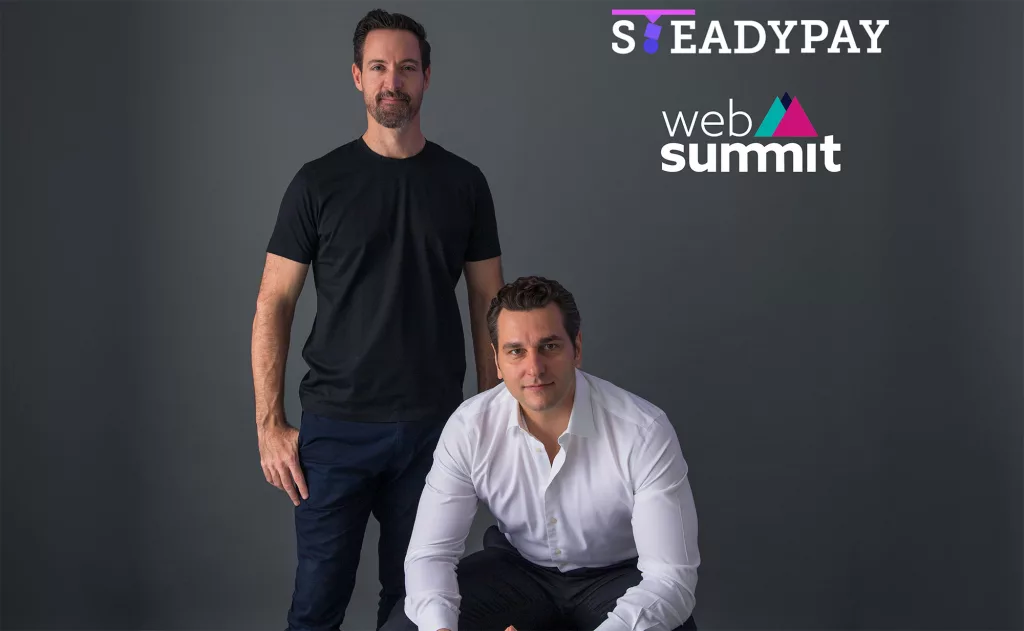SteadyPay Embedded Microfinance Fintech: Safety Net for the Gig Worker
SteadyPay, the award winning FinTech, is at the forefront of delivering accessible and innovative financial solutions for independent workers in the UK’s gig economy. In an industry where income fluctuations are commonplace, SteadyPay stands out as an ethical financial provider, eschewing interest charges in favor of a simple transparent subscription fee.

John Downie CEO & Viktor Muhhin CRO
“Our commitment to transparency means no hidden fees or accruing interest,” says John Downie, CEO of SteadyPay. “While conventional loans pile on interest, SteadyPay offers a clear and straightforward financial solution,” adds Downie.
SteadyPay’s mission is to enhance the financial security of those often overlooked by traditional credit systems. Founded and led by John Downie, also known as JD, the CEO brings a wealth of experience in the financial services sector. JD’s background provided the insights to identify what traditional banks frequently overlook. With extensive experience in credit risk solutions for major banks and successful entrepreneurship in the consulting industry, JD’s journey led to the creation of SteadyPay, addressing an unmet market need. SteadyPay ensures stability and consistent earnings when income falls below the monthly average, making it a vital resource for modern workers.
“While traditional loans mount interest, with SteadyPay, what you see is what you get.”
John Downie CEO
According to JD, “SteadyPay is not just another financial service; it’s a lifeline for many in today’s evolving work environment.”
The distinction between SteadyPay and payday loans is stark. While payday loans often come with exorbitant interest rates, SteadyPay only requires repayment of the principal amount, with interest replaced by a transparent platform subscription fee. JD emphasizes, “Our transparent structure ensures no hidden charges or accumulating interest.”
In summary, SteadyPay stands out by offering a clear and ethical financial alternative to the gig economy, bringing financial stability and peace of mind to independent workers across the UK.
This interest-free micro-lending initiative is funded through a lending syndicate comprising High Net Worth (HNW) individuals and UK institutions. In return, this debt funding yields an attractive annual interest rate of 15%-18%. SteadyPay operates under the regulatory oversight of the Financial Conduct Authority (FCA).
SteadyPay has garnered substantial investment support from a number of VCs including Ascension Ventures, Digital Horizon and many notable European fintech angel investors like Henry de Zoete, the founder of Look After My Bills which was acquired by GoCo Group PLC (owners of GoCompare) in July 2019. After raising global investment Henry also secured the best deal in the history of BBC’s Dragons’ Den.
SteadyPay disrupts traditional credit scoring methods by harnessing open banking data to focus on an individual’s current financial status. The platform’s subscription model includes a credit-building service, helping users improve their traditional credit scores and attain financial freedom.
Viktor Muhhin, Chief Revenue Officer at SteadyPay, or “Vik,” is an accomplished entrepreneur with extensive experience in scaling businesses fast. Vik underscores the company’s mission: “We are dedicated to improving the quality of life for those underserved by traditional financial institutions by offering accessible and user-friendly lending solutions. Throughout our journey, we’ve identified strong demand for our technology and the desire of partners to leverage our expertise, technology, and liquidity to enhance their financial performance, customer loyalty, and overall customer value.”
The need for lending solutions tailored to individuals with irregular incomes is on the rise, prompting the development of a specialised solution. There is a considerable appetite for seamless integration of SteadyPay’s lending platform into the offerings of neobanks and marketplaces, customised under their own branding, to meet the demands of customers actively seeking financing solutions.
“We are dedicated to improving the quality of life for those underserved by traditional financial institutions by offering accessible and user-friendly lending solutions. Throughout our journey, we’ve identified strong demand for our technology and the desire of partners to leverage our expertise, technology, and liquidity to enhance their financial performance, customer loyalty, and overall customer value.”
Viktor Muhhin CRO
Statistics reveal that nearly two in five workers (40%) face ‘persistent income volatility,’ experiencing significant fluctuations in their monthly earnings at least six times a year. This income instability places considerable pressure on households, making it challenging to cover routine expenses and save for the future.
Vik emphasises, “At SteadyPay, we proudly consider ourselves both advocates and experts for gig workers. It’s essential to note that the gig economy encompasses a diverse group beyond well-known platforms like Uber and Deliveroo, including individuals without a fixed income, such as hourly or project-based workers in hospitality, retail, healthcare, construction, and civil service sectors.”
The gig sector’s growth is not only ongoing but also a primary driver of economic expansion. In the United States, between 2010 and 2020, the overall economy expanded by a mere 1.1%, whereas the gig economy saw a remarkable growth of 15%. While the gig economy provides unmatched flexibility, enabling individuals to work on their terms, it comes with downsides, including the absence of paid holidays, sick leave, pensions, and erratic income. These challenges contribute to financial stress, resulting in a short-term financial outlook characterised by living paycheck to paycheck.
JD will be speaking on stage at the upcoming WebSummit in Lisbon, where he will speak about how fintech can help solve the cost of living crisis. As part of this they will be unveiling ExtraCash, which assists low income or low credit score workers in obtaining credit for a fixed monthly fee of only GBP £14. The product is already experiencing explosive growth, signing up thousands of new customers in the UK, with the country’s cost-of-living crisis contributing to this surge.
“SteadyPay is the safety net the modern worker deserves.”
Growth is driven both by B2C and B2B business development. B2C expansion is powered by word of mouth, marketing activities, and social media outreach. The B2B strategy involves forming equitable partnerships with neobanks and other financial institutions. These partnerships provide partners with access to innovative technology for fee generation within their customer base, with the financing off-balance sheet as SteadyPay manages the liquidity. One such partner, Pockit, which offers credit to its customers, has achieved a remarkable conversion rate of over 20% among its non-prime segment. The success can be attributed to an embedded approach and proprietary open banking technology enabling preapprovals.
For many young adults grappling with financial challenges due to irregular income patterns and traditional banking obstacles, SteadyPay offers a new lifeline and a pathway to financial independence. Says JD: “SteadyPay serves as the safety net that today’s workforce truly deserves”.
You can meet JD and Vik at the Web Sumit 2023 in Lisbon, November 13-16.
You may have an interest in also reading…
New Business-Registration Portal Goes Global
A new web portal has been launched to help companies directly access, and assess the user-friendliness of, business registration websites
Lord Waverley: Drone Industry Needs a Coherent Voice — and Some Interest From Investors
Drones are changing the way in which we interact with one another. From commercial applications to lifesaving transportation, drones are
Jury for AIM IPA Awards Receives Recognition
The esteemed jury members for the AIM 2018’s Investment Promotion Agency (IPA) awards receives recognition for their kind support when

















































































